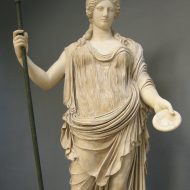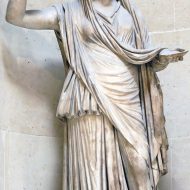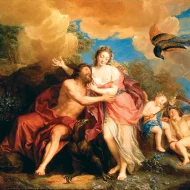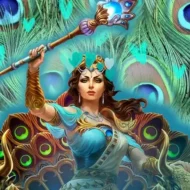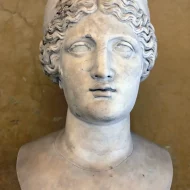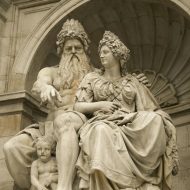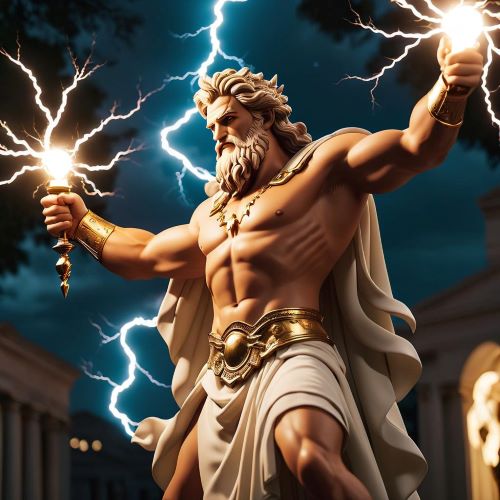Hera : The Queen Mother
Listen
At a glance
| Description | |
|---|---|
| Origin | Greek Mythology |
| Classification | Gods |
| Family Members | Cronus (Father), Rhea (Mother), Zeus (Husband), Demeter, Hestia, Poseidon, Hades (Siblings), Angelos, Eileithyia, Eleutheria, Eris, Graces, Hebe, Ares, Hephaestus, Typhoeus (Children) |
| Region | Greece |
| Associated With | Fertility, Marriage |
Hera
Introduction
Hera was the wife of Zeus and the Queen of Olympus. She was also regarded as the goddess of marriage and family. Their union was not a happy one, as Zeus had multiple affairs. Hera was jealous of her husband’s numerous affairs, and she would do everything in her power to punish his partners.
Hera was a daughter of the Titan, Cronus and the Greek goddess Rhea. Throughout the ancient world, she was worshipped and played an important role in Greek literature. She was often depicted as a rancorous wife who hated the heroines who loved Zeus. Early in the history of Zeus, Hera was regarded as the only lawful wife of the king. She eventually replaced Dione, who shared the oracle at Epirus with Zeus.
Physical Traits
She was often depicted as a fairly pretty woman who was fully clothed. Hera would often wear a variety of accessories, such as a veil, a scepter, and a pomegranate. She sometimes carried a cuckoo, which is a token of how she was taken in by Zeus.
She often accompanies herself with a sacred animal, such as a peacock. The cow is regarded as an important animal for Hera, and she was depicted as a stern and majestic matron with a peacock as her sacred bird.
Family
Hera was the third child of Rhea and Cronus, and she was following in the footsteps of Demeter and Hestia. Like all of her siblings, she was also swallowed by her father and is sometimes regarded as the oldest of the three daughters of Rhea and Cronus. According to some accounts, Hera gave Zeus multiple children. Some of these include Ares, the God of war; Eileithyia, who is the goddess of childbirth; Hebe, the god of youth everlasting; and Hephaestus, who is the god of fire. She also gave birth to a child, who was named Hephaistos, in response to Zeus’ single-handed birth to Athena.
As the wife of Zeus, she had no choice but to be faithful. Even though she was pretty, not many men dared lay hands on her. Zeus would punish Endymion for trying, and Ixion was also tricked into falling in love with a cloud that was made in Hera’s image. Hermes then set him on fire.
Other names
Based on the various cults that existed during this period, Hera is believed to have been a very ancient goddess. Hera’s name is usually translated as Mistress or Lady, and it’s assumed that she did not have an original name. Her Roman counterpart, who was also a goddess, was named after the month of June.
Hera is often referred to as white-armed and cow-eyed, and Homer often used these terms to describe her. It was also believed that she would bathe in a spring every year to renew her virginity, which was a common practice.
Hera has various possible etymologies. One of these is that it could be connected to Greek hura, which means season, or it could be interpreted as a symbol of love, as is the case with Plato’s argument that Zeus loved Hera before he married her. Hera was also an anagram, which means air, according to Plutarch.
Powers and Abilities
She was regarded as a queen of heaven and a consort of Zeus. She was also known to be the goddess of marriage and women’s life. Her second sphere made her protective of women during childbirth, and she was given the name Eileithyia.
Hera was also known to be a patron of the cities of Smos and Argos. Because of this, she had a similar position to that of Athena at Athens. Her Argive ritual was very agricultural, and she held a Shield ceremony at Smos. An armed procession was also held in honor of her. The concept of a city goddess was based on the various functions that were attributed to the goddess of a Greek state. These included being the chief in both war and peace.
Modern Day Influence
Hera has not been seen as a prominent figure in popular culture, unlike the likes of Heracles and Zeus. In the 1997 Disney animated film Hercules, she appeared as a background character. The role was an interesting twist on her own story, as she is the mother of Hercules, who is distraught when his infant is mortal and forced to become a part of the humans. In another show, Helen of Troy, she is depicted in a scene from Judgment of Paris. Hera was not developed properly in popular depictions, which might reflect the confusion surrounding her personality.
Related Images
Frequently Asked Questions
Who is Hera the goddess of?
In mythology and ancient Greece, Hera is regarded as the goddess of childbirth, women, marriage, and family. She is the sister of Zeus and the daughter of Rhea and Cronus. Animals that can be associated with Hera include the peacock, the lion, and the cow. In some cities, Hera was also honored with an all-women’s athletic competition known as Heraia, which was mainly focused on foot races.
Did Zeus actually love Hera?
It is difficult to say whether Zeus truly loved Hera or not. The stories of Greek mythology often portray complex relationships between the gods, with love, lust, jealousy, and vengeance all playing a role. Ultimately, the nature of their relationship is open to interpretation.
Did Zeus cheat on Hera?
Greek mythology states that Zeus was an unfaithful spouse to Hera, and he had affairs with various goddesses, as well as mortals and nymphs. Hera would often lash out at Zeus’ lovers.
Why did Hera hate Hercules?
Hera, the queen of the gods and Zeus’s wife, was known for being jealous of Zeus’s consorts and the children he had with them. Hercules, also known as Herakles in Greek, was one of these children. His father was Zeus and his mother was a mortal woman named Alcmene12. Hera was not happy when Zeus disguised himself as Alcmene’s husband in order to sleep with her. As a result, Hera held a grudge against Hercules and did everything in her power to try to ruin his life
Why did Hera reject Zeus?
Zeus was a fan of Hera, and Greek mythology states that he wanted to marry her. However, she initially rejected his proposals. After transforming into a wet bird, Zeus ravished Hera and made her fall in love with him.

